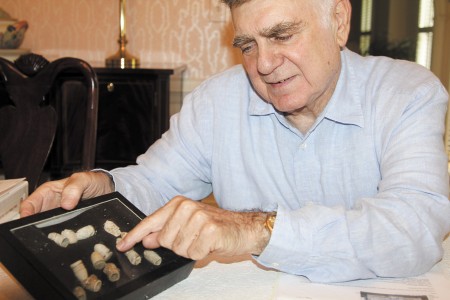About all Lee Weinstein can remember now is that he was jumping up and down with excitement.
He was only 5 years old at the time. Now, nearly seven decades later, he says that moment of overwhelming elation is his only personal memory of World War II. He recalls how his whole family celebrated in 1945 when news came on the big console radio in their Atlanta home that the war was ending. Even at 5, he felt the thrill.
Weinstein now isn’t even sure whether that broadcast reported V-E Day or V-J Day, whether it marked the end of combat in Europe or against Japan. But he does recall that everyone in his family welcomed the report. The war had touched them all. “My grandparents had two sons and one son-in-law serving,” he said.
Soon their soldiers could return.
But Weinstein worries that the soldiers who served in World War II and their first-hand memories of the war are disappearing.
Put bluntly, the soldiers who fought in Europe and Japan are growing older and dying. Weinstein, who this month oversees his first meeting as the new commander of the Atlanta World War II Roundtable, jokes he was chosen for the job at age 73 because the group wanted younger leadership. He says an important part of his new job is making sure veterans in their 80s or 90s have a chance to pass their stories on to another generation.
“The World War II veterans are here, and they are a precious asset,” he said one recent afternoon during a chat at his Sandy Springs home.
“That’s what got me going. I’m very proud to be an American and enjoy the freedoms we have. These guys didn’t give us new freedoms, but they preserved our existing freedoms by beating Hitler and the Japanese. Hitler wanted to take over the world. It was extremely important that Hitler be defeated … and they might be speaking Japanese in Hawaii except for what [World War II soldiers] did. They need to be honored for what they did.”
The Roundtable organized in 1986 as a way to collect and share experiences of World War II vets.
The group now claims 250 members from across north Georgia, Weinstein said. About 100 of them are World War II veterans. The Roundtable also includes veterans of American conflicts in Korea, Iraq and Afghanistan, as well as history buffs such as Weinstein who never served in the military.
In the past, Weinstein said, Roundtable members primarily gathered for luncheon meetings where they heard from veterans or historians, took part in ceremonies or parades honoring veterans, and supported programs for veterans. Weinstein thinks members of the group can do more. “We’ll get veterans and send them out to the schools,” he said. “We’re going to get the word out to youngsters.”
When he was a youngster himself, Weinstein took an interest in a different American conflict. His family lived in the Morningside area of Atlanta, and his neighborhood provided proof of the city’s role in the Civil War. His teachers in elementary school were the granddaughters or great-granddaughters of Confederate veterans, he said. “History was a big, big thing,” he said.
He found other, more tangible, connections literally in his own back yard. He unearthed minie balls, the conical bullets used during the 1860s. He still keeps a set he dug up preserved in a small frame.
His boyhood interest in the Civil War turned into adult participation in Atlanta’s Civil War Roundtable, where he is a past president. There, he met other history fans who introduced him to the World War II group.
As commander of the Roundtable, he hopes to expand the organization’s speakers program by dispatching veterans to public events and into middle school and high school classrooms where they can tell their stories. “I think it’s better to hear it from someone who went through it,” he said.
They’ll have the chance to “meet with classes and tell them why World War II was important, and why it was important that we won.”
And perhaps those another generation will discover something worth jumping up and down about.

